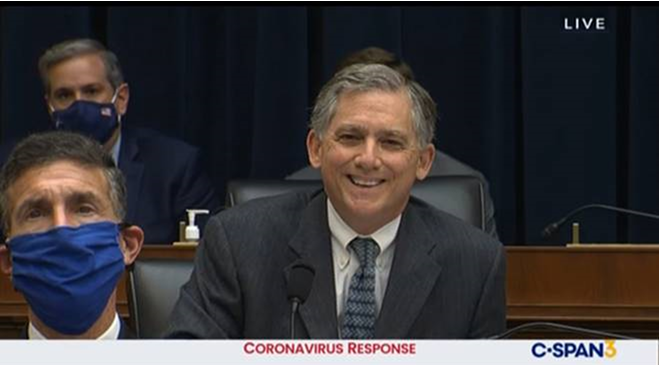Rep. Hill Continues to Push for Small Business Relief
Washington,
September 22, 2020
WASHINGTON D.C. — Today, Rep. French Hill (AR-02) participated in the Financial Services Committee’s hearing entitled, "Oversight of the Treasury Department’s and Federal Reserve’s Pandemic Response." The Committee heard from both U.S. Department of Treasury Secretary Steven Mnuchin and Board of Governors of the Federal Reserve System Chairman Jerome Powell.
At the hearing, Rep. Hill announced that he will sign a discharge petition to extend the Paycheck Protection Program, reiterated his support for Senator Marco Rubio’s changes to the Small Business Administration's 7(a) loan program, and urged Secretary Mnuchin and Chair Powell to reconsider their positions on the Main Street Loan Program to support the MSLP’s inclusion of an asset-based lending approach. To watch the full Q&A portion, click HERE or on the image below.
The transcript of Rep. Hill's questions for Secretary Mnuchin and Chairman Powell is copied below: I want to talk for a minute about this issue for smaller businesses. And I plan on signing the discharge petition in the House today to move Congressman Chabot’s bill to the House floor, which extends the PPP Program and clarifies the forgiveness aspects of that. This is something that should have been done at the end of July. And I was pleased last week that Democratic members of Mrs. Pelosi’s caucus are objecting to her leadership (or lack thereof) in trying to negotiate this COVID package. I hope my Democrat colleagues will join me in signing that discharge petition, because the PPP extension, as Secretary Mnuchin outlined, is a key component to having the tools necessary for the small business recovery. Secondly, in my view, the proposal by Mr. Rubio, that is the Senate bill on the 7(a) loan program is critical because it allows businesses to take this embedded loss of the last six or eight months or that we think is coming and put it on a 20-year amortization schedule at a 1% rate as an SBA product and it is a much better solution than the emergency loan program that the SBA has used during this pandemic, which is really geared toward a hurricane and not to a national pandemic. But the third point is the Main Street Program, and both of you know my views on this, as we’ve talked about it in Oversight Commission hearing and privately, and that is on Friday at 1:00 in a typical Washington, D.C., issue, the Fed released its Frequently Asked Questions and dumped out to the public on Friday afternoon that you would not pursue this asset-based lending-type approach for a different Main Street Term Sheet. Mr. Barr did a good job describing that. I really think that can be done, Chairman Powell, to companies on sound footing, to companies that are not able to reach credit traditionally on reasonable terms, and in the concept of a backstop. I want to press both of you that while it doesn’t fit the Main Street Term Sheet that you have today that took four months to stand up, I still believe that asset-based lending to a solvent company is important. And while you’ve had a key component, another Washington key component in the Frequently-Asked-Question, you said at this time. So, I would urge you to reconsider your position on asset-based lending and offer you each an opportunity to comment. Mr. Powell?" Chairman Powell: "So, we have taken a very close look at it as you know and as the secretary indicated. But we're happy to continue the conversation and we'll do that with you." Rep. Hill: "I really do believe it could be done in the right way. And I think the three things that I commented on — The first two: the 7(a) program and the PPP loan — address the lower loan size that the Chair mentioned. But I do believe there is a solvent niche out there of portfolio lending that could be done on a sound basis that would offer some liquidity for hospitality, particularly, not CMBS per se, but portfolio lending where they have this gap that we saw after 9/11 and we saw after the financial crisis, a very slow increase in business travel. Secretary Mnuchin, you commented that you would like Congress to give you authority to incur risk as it relates to the $500 billion in funding for the Exchange Stabilization Fund, particularly the $454 billion that was not related to airlines and that you propose to reprogram that money for other uses. But, when we had a discussion of this in the Oversight Commission, we issued in our fourth report that we don't believe that you need any additional Congressional authority to reprogram that and take additional risk. Could you comment on that, please?" Secretary Mnuchin: "So let me be clear. I don't think we need authorization, to take additional risk, and let me clarify, I think the Main Street loans, in general, we will be taking losses, because I think this is basically being underwritten on pre-corona EBITDA. What I was suggesting is that we would like to spend that money on other areas of the economy that could be better served. Kids, jobs, more PPP, SBA, long-term loans, and that, unfortunately, we do need Congressional authority to use it in other areas, and we have a lot of money left over in the PPP that has been appropriated by Congress that with simple legislation could allow many hard-working small businesses to get a second loan." |


